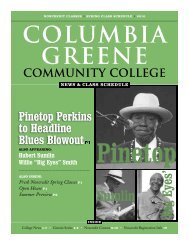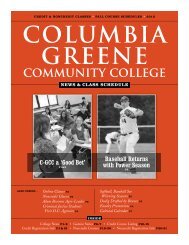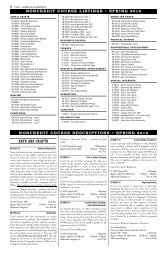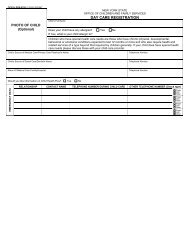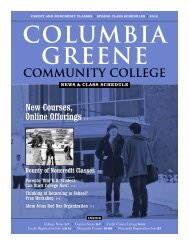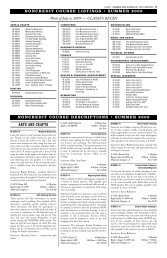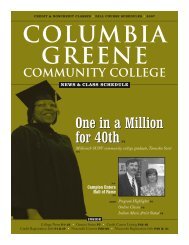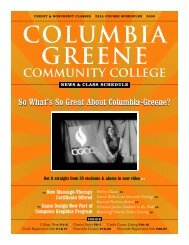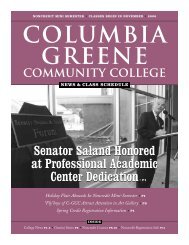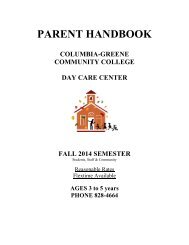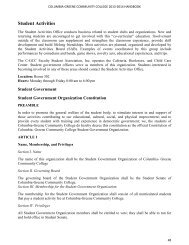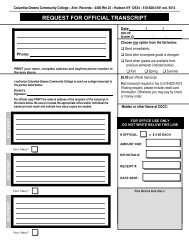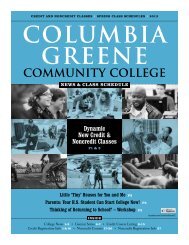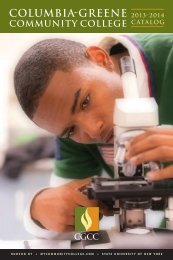Current C-GCC Catalog - Columbia-Greene Community College
Current C-GCC Catalog - Columbia-Greene Community College
Current C-GCC Catalog - Columbia-Greene Community College
You also want an ePaper? Increase the reach of your titles
YUMPU automatically turns print PDFs into web optimized ePapers that Google loves.
COLUMBIA-GREENE COMMUNITY COLLEGE 2012-2013 CATALOG<br />
ProGrAm oUtComes<br />
1. A minimum of 60% of the students<br />
entering NU 101 will graduate from the<br />
program.<br />
2. Graduate passing rate on the NCLEX<br />
will be equal to, or above, the New<br />
York State and national passing rate.<br />
3. 90% of graduates seeking employment<br />
will be able to fnd employment<br />
in nursing within six months after<br />
graduation.<br />
4. A minimum of 90% of the graduates<br />
will rate program satisfaction as<br />
satisfactory or above.<br />
5. A minimum of 90% of employers<br />
will rate graduate performance as<br />
satisfactory or above.<br />
GrAdinG PoLiCY<br />
A. Students must maintain the minimum<br />
grade of C and maintain accepted<br />
standards of care in all nursing<br />
clinical experiences. Each nursing<br />
course consists of three components:<br />
classroom, campus laboratory, and<br />
clinical. In NU 101 and NU 102,<br />
students must average 78% or better in<br />
both classroom and campus laboratory,<br />
as well as “satisfactory” in campus<br />
lab on skills and in clinical. In NU<br />
201 and NU 202, students must<br />
average 78% or better in classroom<br />
and a “satisfactory” in both campus<br />
laboratory and clinical. A “U” in either<br />
campus lab or clinical will result in<br />
failure of the course regardless of the<br />
classroom grade. If performance in<br />
clinical is graded U, the student will<br />
be notifed in writing and given the<br />
opportunity to demonstrate satisfactory<br />
performance. A student exhibiting<br />
unsafe behavior in clinical may not<br />
be given this opportunity and may<br />
164<br />
be dismissed from the course at that<br />
time, as stated in each nursing clinical<br />
evaluation tool. Determination of safe<br />
practice is guided by the ANA Code<br />
for Nurses (see the C-<strong>GCC</strong> Student<br />
Handbook.) The student may appeal<br />
the decision as outlined in the <strong>College</strong><br />
<strong>Catalog</strong>.<br />
B. Students can only repeat one nursing<br />
course one time.<br />
LiCensed PrACtiCAL<br />
nUrse (LPn) CHALLenGe<br />
oPPortUnities<br />
A. Eligibility requirements: LPN<br />
challenge students must meet all<br />
admissions criteria for acceptance<br />
(page 159) and program requirements<br />
(page 161). The challenge applicant<br />
must be a currently licensed LPN<br />
(and provide a copy of the license).<br />
A copy of the LPN license will meet<br />
the prerequisite for Anatomy and<br />
Physiology I (BI 130). No credit will<br />
appear on the C-<strong>GCC</strong> transcript until<br />
the student has matriculated in the<br />
Nursing Program.<br />
B. LPN’s are not eligible to take a<br />
challenge exam if they have already<br />
failed, or withdrawn from, that nursing<br />
course. The only exception is if the<br />
LPN program was completed AFTER<br />
the withdrawal or failure.<br />
C. Licensed Practical Nurses matriculated<br />
in the Liberal Arts/Math Science: Prenursing<br />
curriculum may request to<br />
challenge NU 101 & NU 102. There is<br />
a $135 non-refundable fee paid prior to<br />
each challenge exam. Only one attempt<br />
will be allowed to pass each challenge<br />
exam. The exam must be taken no<br />
more than one year before the student<br />
plans on entering a nursing course.



